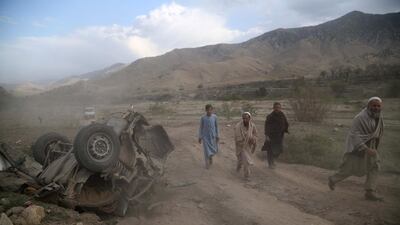As the extended phase of the Afghan parliamentary elections came to a close on Sunday evening, reports of more violence and mismanagement emerged across the country as the death toll from the past two days of voting rose to over 50.
Independent Elections Commission Chairman Abdul Badi Sayat congratulated voters for turning out, saying that around 4 million people out of the 8.8 million registered voters cast their ballots over the past two days at 4,576 polling centers across the country.
Afghan President Ashraf Ghani also thanked citizens for their participating during a speech carried on state TV.
"Afghans did not only show their enemies that they would not surrender to any threats or warnings, but that they also have the power and will to defeat their enemies," Mr Ghani said, referring to threats by the Taliban and an ISIS affiliate warning voters against casting ballots.
But the vote was marred by violence and technical hitches. A roadside bomb in the eastern Nangarhar province struck a vehicle filled with civilians, killing 11 people, including six children, Attahullah Khogyani, spokesman for the provincial governor, said on Sunday. No one immediately claimed the attack.
According to official figures presented by Afghanistan’s Independent Election Commission (IEC), a total of 407 polling centres were completely shut on the first day due to the sensitive security situation in several parts of Afghanistan. Several other polling centres faced technical as well as security issues, hindering normal operations and leaving many voters stranded.
Relief was afforded to Afghan voters when the IEC decided to not only keep the polling centres open for longer hours on Saturday, but also extend polling in at least 253 centres across the country on Sunday.
“After hours of waiting in lines yesterday, I was finally able to cast my vote today,” Rafi Tabee, a Kabul-based media professional, told The National.
Mr Tabee went to his designated polling centre in Kabul several times over the course of the day but was unable to vote.
“There was a lot of mismanagement of the system. There was no order, from morning until evening. We asked everyone what to do and they kept asking to wait,” he said. “I was so unhappy that night. I could not sleep. I was upset that the government couldn’t fix these small problems even after so much money had been spent,” he added.
__________
Afghanistan elections:
Insurgent attacks mar Afghan parliamentary elections
Wounded but undeterred, Afghan blast survivors return to polling stations
Afghanistan Sikh, Hindu community brave danger to vote
Afghan elections 2018: what you need to know
__________
There was also concern of election fraud and issues related to a newly-introduced biometric system. Interior Ministry spokesperson Najib Danish said over 60 arrests had been made on the charge of meddling in electoral affairs.
“At least 40 of these cases are in Kabul alone. Some of those found guilty are government personnel, both civil and military,” he said, adding that “there will be serious legal repercussions for those security officials who intervene in the affairs of the elections”.
Many of those trained in using the new system did not show up for work, causing mass confusion on polling day.
The first parliamentary elections since 2010 are being held against a backdrop of near-daily attacks by the Taliban, who have seized nearly half the country and have repeatedly refused offers to negotiate with the Kabul government.
The security situation improved slightly on the second day of voting. While fewer election-related security incidents were reported on Sunday, bodies of five election observers who were kidnapped yesterday were recovered in Balkh province with gunshot wounds.
“Victims were all observers,” Sayed Sarwar Hussaini, police spokesman in Balkh, told The National, adding that they suspected Taliban involvement in the kidnapping and attack.
The Taliban had issued a boycott ahead of the elections despite engaging in peace negotiations with the US administration earlier this month. Over the course of the first day, the Afghan Interior Ministry recorded 193 violent incidents, including suicide attacks, explosions and gunbattles. The majority of those attacks have been attributed to the Taliban, who had referred to the elections as a “bogus” and “sham process” in their statement.
However, despite these threats, Afghans turned up to vote in large numbers. “Participating in the elections is our duty,” Mr Tabee said.
He spoke of witnessing many people growing concerned as they read reports on social media of explosions happening across the city as they waited in line.
“We know why there are explosions happening, and the only way to address the lack of law is by bringing in stronger lawmakers,” he said. “I want to vote for the new generation.”

